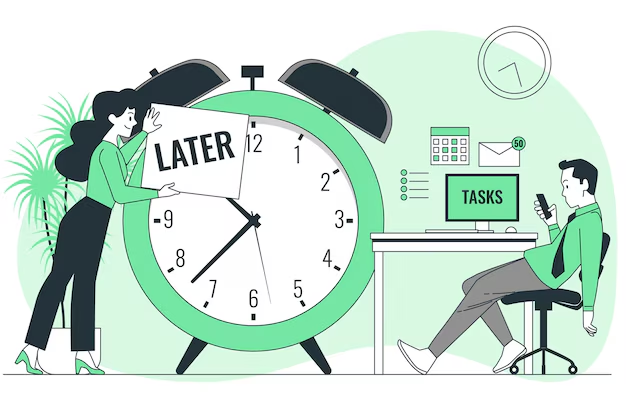1. Introduction
-
- Definition of procrastination
- Importance of overcoming procrastination
2. Understanding Procrastination
-
- Psychological aspects
- Common reasons for procrastination
3. Setting Clear Goals
-
- SMART goals technique
- Breaking tasks into smaller steps
4. Creating a Schedule
-
- Time blocking method
- Prioritizing tasks
5. Eliminating Distractions
-
- Identifying distractions
- Implementing strategies to minimize distractions
6. Developing Self-Discipline
-
- Techniques for improving discipline
- Building a routine
Introduction
Procrastination, simply put, is the act of delaying or postponing tasks. It’s a common behavior that affects people across all walks of life, from students to professionals. While it may provide temporary relief, the long-term consequences can be detrimental to personal and professional growth. Overcoming procrastination is crucial for achieving success and fulfillment in life.
Understanding Procrastination
-
- To effectively combat procrastination, it’s essential to understand its roots. Psychologically, procrastination often stems from fear of failure, perfectionism, lack of motivation, or poor time management skills. By recognizing these underlying factors, you can address them head-on and develop strategies to overcome them.
Setting Clear Goals
-
- One of the most powerful antidotes to procrastination is setting clear, achievable goals. Utilizing the SMART goals technique (Specific, Measurable, Achievable, Relevant, Time-bound) helps clarify objectives and provides a roadmap for success. Breaking down larger tasks into smaller, more manageable steps also makes them less daunting and easier to tackle.
Creating a Schedule
-
- Effective time management is key to combating procrastination. Implementing the time blocking method, where you allocate specific time slots for tasks, helps optimize productivity. Prioritizing tasks based on urgency and importance ensures that you focus your energy on high-value activities, reducing the likelihood of procrastination.
Eliminating Distractions
-
- Distractions are the enemy of productivity. Identifying common distractions, whether it’s social media, email notifications, or noisy environments, allows you to implement strategies to minimize their impact. This may involve setting boundaries, using website blockers, or designating a distraction-free workspace.
Developing Self-Discipline
-
- Self-discipline is a muscle that requires regular exercise to strengthen. By practicing self-discipline techniques such as setting boundaries, establishing a routine, and practicing mindfulness, you can cultivate the discipline needed to stay focused and on track with your goals.
Using Positive Reinforcement
-
- Rewarding yourself for making progress and achieving milestones is a powerful motivator. Whether it’s treating yourself to a small indulgence or celebrating achievements with friends and family, positive reinforcement reinforces positive behavior and encourages continued progress.
Utilizing Time Management Tools
-
- In today’s digital age, there’s no shortage of tools and techniques to aid productivity. From productivity apps and software to the Pomodoro Technique, which involves working in short bursts with regular breaks, finding the right tools that align with your workflow can significantly enhance productivity and combat procrastination.
Seeking Accountability
-
- Having someone hold you accountable can be a game-changer in overcoming procrastination. Whether it’s partnering with an accountability buddy, joining a mastermind group, or hiring a coach, accountability provides the support and encouragement needed to stay committed to your goals.
Embracing Failure and Learning
-
- Failure is an inevitable part of the journey to success. Instead of fearing failure, embrace it as an opportunity for growth and learning. By reframing setbacks as valuable lessons and adjusting your approach accordingly, you can turn failure into fuel for progress and ultimately overcome procrastination.
Conclusion
Procrastination is a common challenge that can hinder personal and professional growth. However, by implementing these powerful strategies – setting clear goals, creating a schedule, eliminating distractions, developing self-discipline, using positive reinforcement, utilizing time management tools, seeking accountability, and embracing failure and learning – you can overcome procrastination and unlock your full potential.
FAQs
1. How do I stop myself from procrastinating when I’m feeling overwhelmed?
-
- Break tasks into smaller, more manageable steps and focus on one thing at a time.
2. What if I keep procrastinating despite trying these strategies?
-
- Experiment with different techniques and seek support from a mentor or coach to identify underlying issues.
3. Is procrastination always a bad thing?
-
- While occasional procrastination is normal, chronic procrastination can hinder progress and lead to stress and anxiety.
4. How long does it take to overcome procrastination?
-
- It varies for each individual, but with consistent effort and dedication, significant progress can be made over time.
5. Can procrastination be a sign of underlying mental health issues?
-
- In some cases, yes. If procrastination is significantly impacting your daily life, it may be beneficial to seek professional help.




